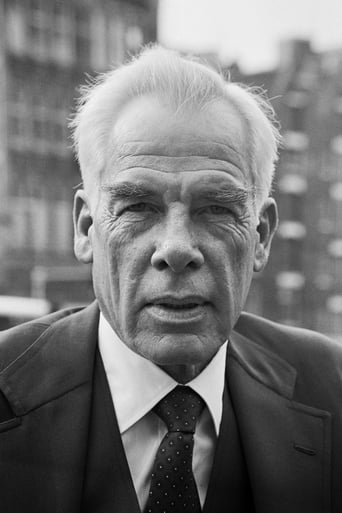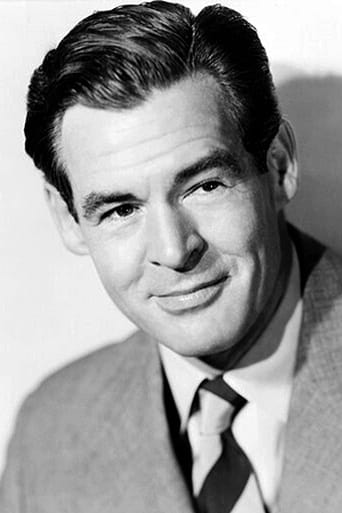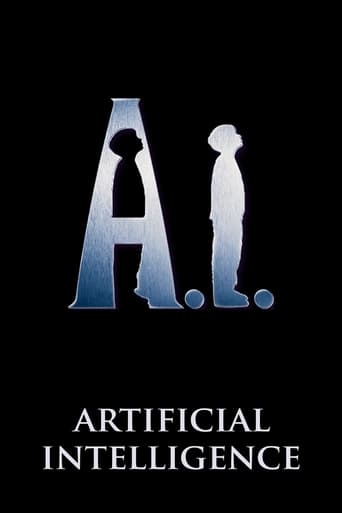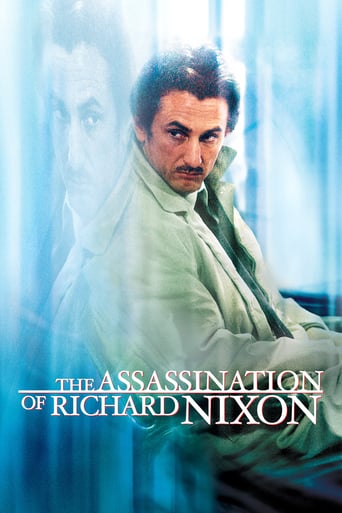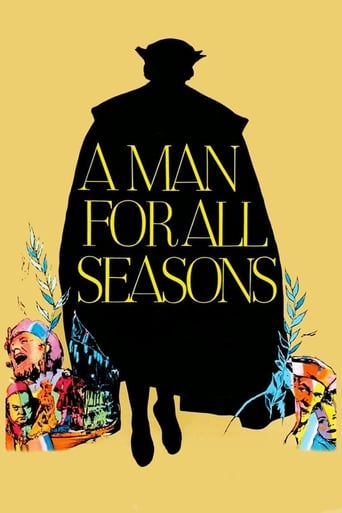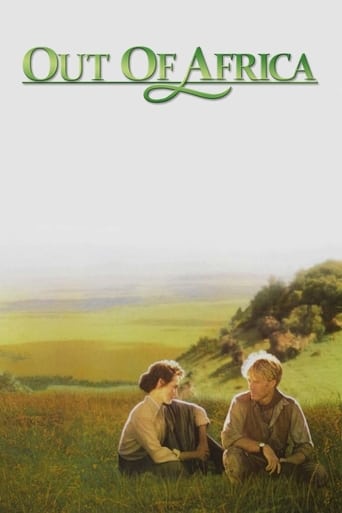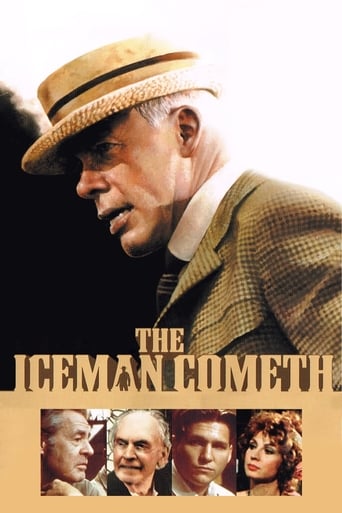
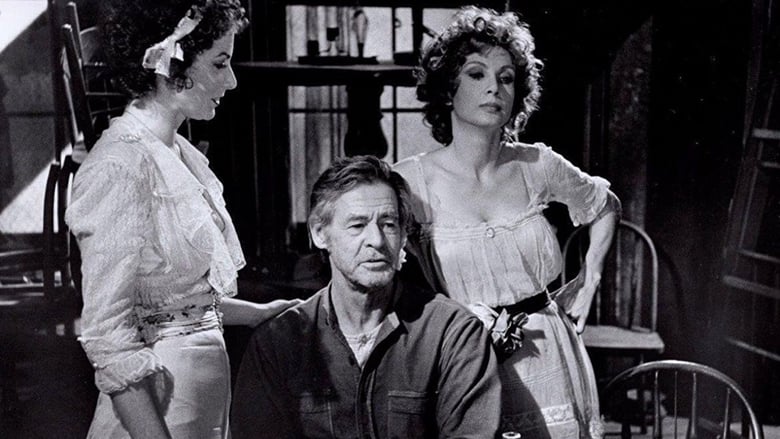
The Iceman Cometh (1973)
Set in 1912, inside a dive bar named The Last Chance Saloon, its destitute patrons eagerly await the arrival of Hickey, who arrives annually and props everyone up with free drinks and spirited stories of his travels. However, when Hickey does show up this year, it is with a message of temperance and an exhortation to give up hopeless dreams and face reality.
Watch Trailer
Cast
Similar titles


Reviews
best movie i've ever seen.
A Disappointing Continuation
it is finally so absorbing because it plays like a lyrical road odyssey that’s also a detective story.
It was OK. I don't see why everyone loves it so much. It wasn't very smart or deep or well-directed.
While I don't cover much of the plot in this long film, I do try to explain the philosophy that underpins why a bunch of drunks are sitting around a bar, in 1912 New York, waiting for their friend, Hickey, to arrive. If you'd rather see the film first, then read no further.*** When I saw this 1973 film in the seventies, I thought it was an interesting, if long-winded, exposition about the evils of alcohol addiction and sloth, and not much else. Being in my early thirties then, y'see, I was more interested in less depressing topics.Recently, however, I obtained a DVD and decided to have another look. When I finished I realized, of course, that the play is indeed much, much more than my first, immature assessment. In fact, as I watched, it became very clear to me that the whole play is an allegory that plays no pun intended - with the biblical John the Baptist, The Last Supper, and the betrayal by Judas Iscariot.Intrigued by those thoughts, I searched the internet for O'Neill biographies (as I knew next to nothing about him) because I had an idea that O'Neill had been a Catholic who'd rebelled and that he had fully intended his play to (almost) parody those religious icons. Various search results confirmed O'Neill's religious background and his rejection of Catholicism while the following, from another online source, supports the idea of a religious underpinning for the play: "The Iceman Cometh, the most complex and perhaps the finest of the O'Neill tragedies, followed in 1939, although it did not appear on Broadway until 1946. Laced with subtle religious symbolism, the play is a study of man's need to cling to his hope for a better life, even if he must delude himself to do so." So, yes, the play is about a lot of drunken loafers in various stages of despair, but they all represent the status of humanity, according to O'Neill: besotted by its own self-delusion and self-pity.Consider Hickey (Lee Marvin, in a truly great performance) as a modern rendition of the biblical John: the quintessential salesman, the sharp-talking shark who can tear you to pieces verbally, and the man who has the message that will save you; yes, you twelve, you drunken bums, sitting on your asses twenty-four-seven, drowning yourselves in your collective delusions. Forget your pipe-dreams, says Hickey, stand up for yourselves, on your own feet, and get out there and face the world, the new world that is dawning for each, if only you would act! But first, you must give up the first, and maybe worst, crutch: booze. Because, continues Hickey, I've seen the light and I've given up drinking ah, well, except for the odd, important and festive occasion, y'know...So what could be more important than a birthday party for Harry Hope (Frederic March), the bar owner without hope, who hasn't stepped outside since his wife died twenty years earlier? He and the other eleven men in that bar have been waiting and waiting for Hickey to come and lavish his eloquence (and drinking money, of course) upon them all.So, Hickey delivers, and then some, by convincing them all, except Larry Slade (Robert Ryan in his best-ever performance), in a moving - literally and figuratively - tirade during and after that Last Supper that Hickey will ever attend at this bar. Why last? Because Hickey has an unsavory secret that shocks them all, (except Larry) to the core when he is forced to reveal it and, in doing so, they all (except Larry again) reject Hickey's promise of personal salvation. Hence, when Hickey meets his fate with the law, as did the biblical John, and the bums go back to their booze and their delusions, Larry is the only one to realize that he can no longer remain on "the grandstand of philosophical detachment" and must act now according to his convictions.Ironically, Larry's decision seals the fate of Don Paritt (a very young Jeff Bridges), a thoroughly unlikable coward and betrayer of lost causes. Lacking true courage to initiate the action to atone for his crime, Don beseeches Larry to decide for him, with the inevitable result. And, as Larry savors his new found "freedom", such as it is, he looks through the window, and specifically away from his one-time drinking partners who are all now busily, once again, deluding themselves with drink.As the epitome of a modernity that rejects religion, Lee Marvin says it all, with consummate skill and panache; only Robert Ryan's Larry (O'Neill's alter ego), perhaps as a counterpoint to the biblical Peter, sees Hickey's message for what it truly is a rejection of that "opium of the masses" as Karl Marx opined - and finally decides to act for himself. The other ten 'apostles' at the bar are lost souls because it's sufficient for O'Neill, in my opinion, that Larry finally woke up; the rest of the world can live in Hell.What's missing or, rather, who's missing from this whole play is, of course, a Christ-figure. Again, given O'Neill's view of religion as a delusion, that is entirely fitting.The setting all in one long, dark and moody bar the directing from Frankenheimer, the photography that uses long takes and medium closeups throughout, the production standards, all add up to an experience that is only rarely presented. And, without a doubt, all of the actors performed to the peak, I think, of their prowess.Highly recommended for all theatre and cinema buffs.I must now, of course, search for a DVD of the 1960 version and prepare a comparative review.
Never having see "Iceman" live or on film, I watched the 1973 Lee Marvin version first, then the 1960 Jason Robards version, because I wanted to see the Lee Marvin approach without the bias of having previously seen the famous Robards approach. Both performances were excellent: Marvin was more believable as a coarse, cheating salesman, while Robards was more soft and humane. Each connected deeply into the playwright's vision, but differently. The major difference between the two productions is not Hickey, but his main foil, Larry Slade. In the 1973 version, Ryan opens the play with hopeless bitterness, a darkness that suffuses the first scene. In the 1960 version, McCormick begins the part with a lighter, bemused detachment. In the 1960 version, Slade is reading newspapers, which shows he still has an interest in the world. In the 1973 version, Ryan's Slade is in gloom, no newspapers in sight and no light to read them by even if he had them. In fact, the first scene of the 1973 version is so slow and gloomy that it is very hard to see any reason to watch the play. None of the characters makes you want to spend a little more time with them, and none of them interact with each other in a way that is friendly or kind. The 1960 version is much lighter, and the emotional ties between sub-groups of characters are more developed. The 1973 version comes to life only when Hickey enters (the 1960 version is alive from the start), and Marvin's Hickey redeems the tedium of the scenes that precede him. Also, in the 1973 version of the 1st scene, when one character is speaking to another, the camera is often behind and to the side of the head of the listener, showing only the back and side of the listener's head. This prevents us from seeing the listener reacting to the speaker, which turns all these speeches into soliloquies delivered into the air. Now, I don't know which version is closer to O'Neill's vision (although we can be pretty sure the 1960 version is closer to O'Neill's text), but I can say that in the 1973 version, up until Marvin's Hickey arrives, it's hard to feel any desire to listen to any of these self-involved, isolated, moody failures. In the 1960 version you get a sense that this is a community of people with some positive aspects a web of friendships, or at least, the appearance of friendships. A problem common to both versions is the implausibility of a room full of these sleeping or lethargic people slumped over the tables, allegedly because they were all waiting for Hickey. A reviewer pointed out that the play reworks the 'Last Supper,' with Hickey in the Christ role, and the other men regulars in the role of the 12 disciples. However, there are 13 male characters in addition to Hickey, so it appears that O'Neill has changed the structure. As regards the 'Last Supper' model, the Christ character is not Hickey, but Larry Slade. He is the one whom Parritt comes to Parritt, who betrayed the movement and his mother for money, and who thus functions in a Judas role, and who seeks Slade's forgiveness. But the Christ here Slade is a 'savior' who knows nothing, who has lost faith in his own movement. Hickey is the new character, one who was not at the 'Last Supper.' Hickey's repeated protestations of wanting to help the others, and the way in which he can help them, shows that Hickey is not a Christ, but a kind of Buddhist bodhisattva to quote one definition, a being 'who delays his own final and complete enlightenment in order to save all sentient beings out of his enormous compassion on a mission to liberate all sentient beings, and only then will he rest and complete his own enlightenment.' In 1939, when O'Neill wrote "Iceman," he was deeply interested in Eastern religions, and in fact wrote "Iceman" while living in a home he gave an Eastern name, "Tao House," meaning 'the right way of life.' At the table where the characters are all gathered for Harry Hope's birthday party, Hickey talks about how his goal is to get all of the inmates of Hope's bar feeling "you won't give a damn what you are anymore" and "don't give a damn about anything anymore" this is the indifference, the non-feelingness, of the eastern concept of nirvana. Immediately after this, Slade responds by characterizing the people in the saloon as "us poor pipe-dreaming sinners along the sawdust trail of salvation" the imagery of Christian salvation. This sets up the fundamental issue of the play: whether Buddhist concepts of nirvana can replace the failed (at least, failed to O'Neill) salvation concepts of Christianity. By the end of the play, we know O'Neill's answer: no. Hickey learns first that although he has forced the others to face up to the failed people they really are, this has not brought them peace; and then, almost as an accident, Hickey himself learns that his own peace has been based on a flattering lie to himself about himself. Once he sees his own reality, the reality of how fallen he really is, not even he, the bodhisattva, can face it. Seeing how the others are clinging to happiness by feeling hope that they are better than they really are, he decides to fall-in with their self-lying, so that they will also lie and tell him that they agree that he is a better person than he really is. Only Slade, the Christ-figure, says that Hickey has converted him to be able to face his worthlessness and self-deception. At this point, Parritt following the Judas model, Judas who hung himself out of guilt kills himself by leaping from a height.
Can I tell you that I have waited 30 years to see this movie? When I was in my late teens, I received a brochure in the mail advertising the American Film Theater series. One of the films in the series that made my eyes pop was the promise to show Eugene O'Neill's "The Iceman Cometh". I was a big fan of O'Neill's work, but felt cheated by AFT's disastrous marketing concept of showing it's films to season subscribers only, and then only giving them two days to see the film. I was forced to take a pass, but mourned my loss ever since.This play is rarely performed. At four hours, it would task most theater companies, and Hickey's 25 minute soliloquy in the last act requires only the best actors to pull off. I was fortunate to have seen this play, once in my life, performed on the stage. This was Chicago's Goodman Theater production starring Brian Dennehy as Hickey in 1990. I felt fortunate, but came away from that production dissatisfied. Dennehy was a "good" Hickey, but not a great one, and the rest of the cast left me a little shallow. How glad I was then to discover that this film had been re-released. By pure chance, I saw a notice in the paper that this film would be showing at the Gene Siskel Film Center in Chicago. I couldn't let this opportunity pass by a second time. I attended the screening and was absolutely stunned. It exceeded my expectations.First of all, the cast was stellar. Robert Ryan played his last film role here, and it was perfect. I don't say something like that very often. I cannot imagine a better Larry.Fredric March played his last role here too, as Harry Hope. Also an excellent performance.The question everyone would be asking about is Hickey, played by Lee Marvin. Was he up to the role? To my surprise, Marvin couldn't have been a better choice.Hickey was a salesman, and a rare one at that. He was the type of salesman that could knock on your door and convince you that what he had to sell was what you needed. A salesman like that had to exude a sense of complete self confidence. They would have to be totally sure of themselves and show it. Lee Marvin did that perfectly.The tragedy of Hickey was that he was his own best customer. He was a tortured soul until he came across a solution that made him feel that he could live with himself again, thus creating his own pipedream. His mistake was to think he found a solution that would save humanity.Unfortunately, in Harry Hope's dive, pipe-dreams and illusions were the only thing the patrons had to live for. Tampering with that created disaster. Lee Marvin convinced me that he was Hickey, and in a play like this, that is quite an accomplishment.By the way, I discovered that this film is now available on VHF and DVD. I am getting a copy.
This is more of a question than a comment. I recently taped the 1973 film version of THE ICEMAN COMETH from the Encore cable film channel. The movie, which is excellent and highly recommended (though seeing a production of the play is even more effective), was vastly shorter (by an entire hour!) than I had remembered it being when I saw it twice back in the 70's and 80's. I am almost certain that this three hour version aired by Encore is something doctored up by the studio to offer a more palatable running time to cable channels and art houses.My question is: does anyone know if the four hour version still exists; and if there is anyway of getting my hands on it? The many, MANY, internal cuts in the three hour version (probably unnoticeable if you're not familiar with the play or the longer version of the movie) seriously undercuts the power of O'Neill's great play.
